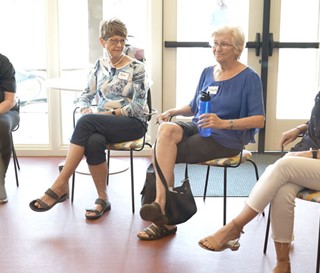Arizona Woman Organizes Dementia Care Support Groups

Nicole Crothers (far right) leads a support group for dementia caregivers.
Nicole Crothers is no stranger to dementia. In her nine years as a dementia educator and medical social worker at Hospice of the Valley’s Dementia Care and Education Campus, she has helped numerous patients, care partners, and families through one of the most emotionally and physically taxing journeys ever.
She keeps busy, with her duties at Hospice of the Valley taking her through the many different aspects of dementia care. She hosts two weekly support groups: a virtual support group to help care partners, and a Memory Café group, where caregivers meet face to face to share experiences, while their loved ones engage in fun activities and crafts with trained professionals. When she isn’t leading support groups, she’s working with the campus’ Supportive Care for Dementia program, which facilitates in-home volunteer visits for families living with all stages of dementia.
“In my role as dementia educator, and then with my role as support group facilitator, I've been able to interact with people living with dementia and their families in many different ways,” Crothers said.
“Part of my role is education. So I’m providing education [to my community] on disease symptoms, likely disease progression, approach strategies, and how to enhance the quality of life for the person living with dementia and their care partner. I've had many opportunities to connect families with resources in the community they would have had no other way to hear about if we hadn't been there to help them.”
Crothers has leveraged these resources many times to improve the quality of life for those with dementia and their care partners. In one case, she managed to track down a patient, ensure she received home-cooked meals, had a guardian, and as time wore on, that the patient had access to a quality assisted living community.
During Crothers’ time with Supportive Care for Dementia, the team kept growing, eventually taking on volunteers, who now are more important than ever.
“I've had a lot of people on my team volunteer to visit not just people living with early-stage dementia who are alone, isolated and needing support, but also folks living with a spouse or adult child who need respite and socialization,” Crothers said.
Many of Hospice of the Valley’s dementia volunteers are college students pursuing a career in the medical field, but volunteers need not have prior experience — just a genuine desire to do good in their community.
“I've seen some amazing stories on both sides — from the patients as well as the volunteers. I'm able to read the journals often for some of those who take our classes and are paired to do the volunteer work. And every year, I'm amazed at the growth of the students and the joy that they feel in [their] connection with the [patient].”
Above all, Crothers values mutual positive experiences in volunteers and patients alike. She fondly recounts an instance where a patient dealing with aphasia (a symptom of dementia where one’s word recall and speaking ability is greatly diminished) struggled to socialize and communicate with her peers at an assisted living facility, but the volunteer patiently took the time to sit with and get to know her.
“The volunteer visited once a week for several weeks and months to build that connection. She helped her make new friends; took her to some activities and helped her connect with some of the other people, where she wouldn't have had that opportunity without a volunteer helping her.”
Most importantly? Crothers says prospective volunteers need not be deterred by the myths surrounding dementia.
“We provide education. Our volunteer coordinators are available, as well as some of our dementia educators, to provide education on dementia symptoms, [and] make suggestions about ways to connect. We talk about challenges, and what are the supports that are available for the volunteer or the students,” said Crothers.
“We are always available to help when things pop up because we want to make sure that it's a positive [experience] for everyone.”
Written by the ASU Cronkite Agency
